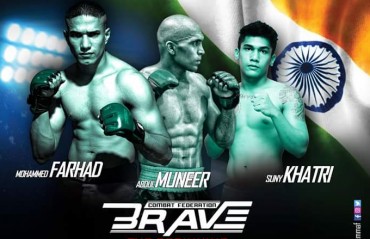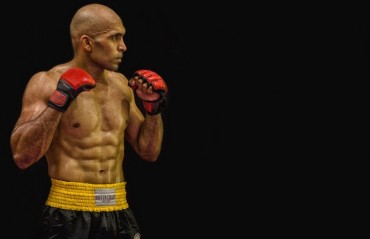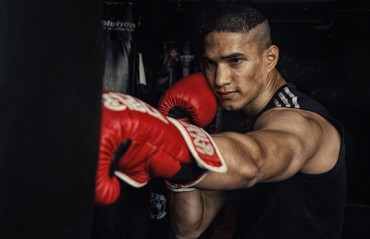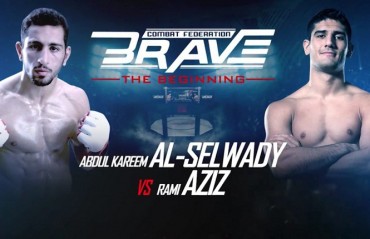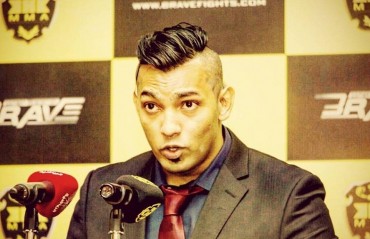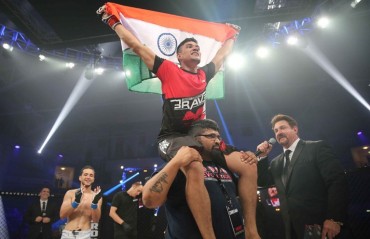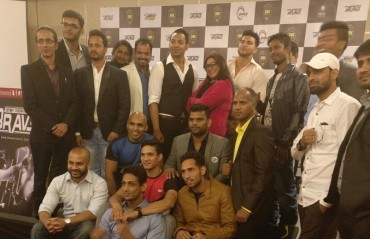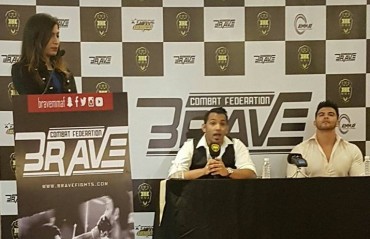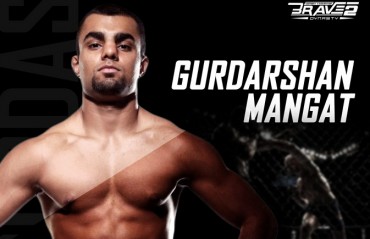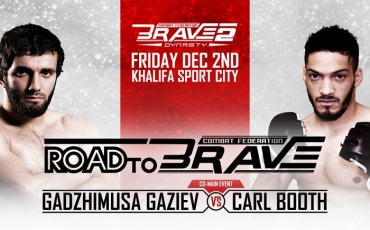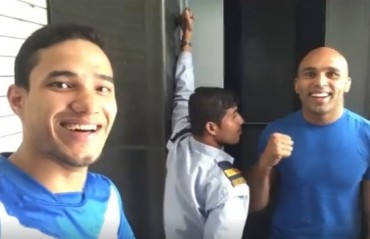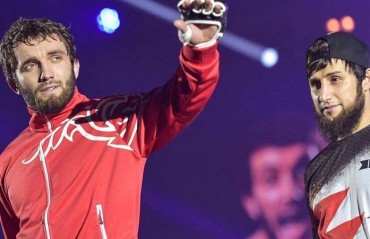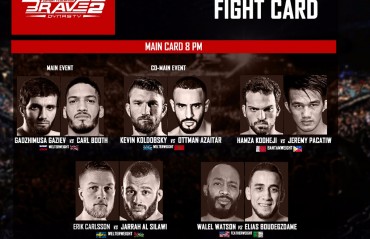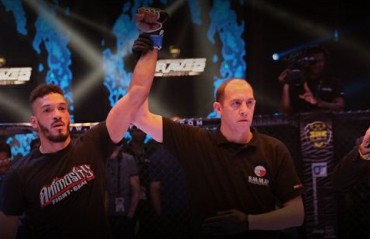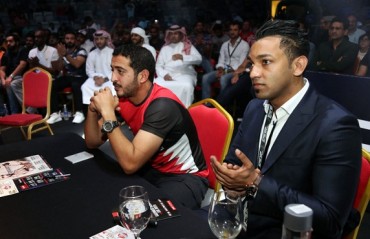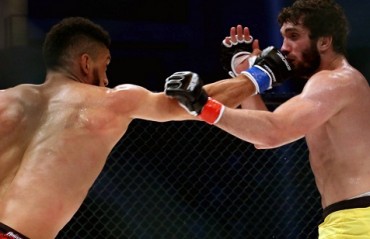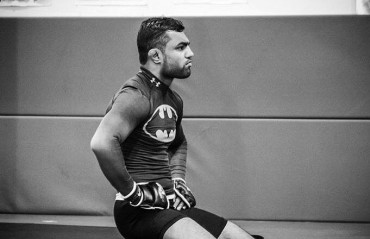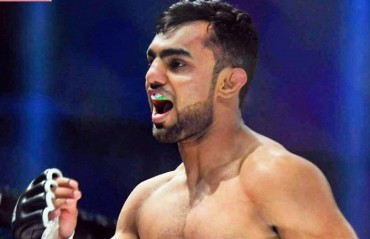#TFGinterview: From US Air Force to the MMA cage – In conversation with Scott Manhardt
- By Renjith Ravindran

- June 03, 2017
It never gets better than the bouts to be officiated by a former f-15 Crew Chief at the United States Air Force. IMMAF official, Scott Manhardt has established as one of the most respected faces of discipline in Asia.
.jpg)
He made his presence felt at Mumbai during Brave 5: Go For Glory organized by the Brave Combat Federation. He is currently officiating at the Bahrain-based MMA promotion, Brave Combat Federation.
The veteran referee had officiated bouts at multiple promotions around the world including Brave Combat Federation, IMMAF events, Superkombat, RXF and much more.
Known for his precise judgments and for being a strict disciplinarian, Scott Manhardt had an exclusive interview for The Fan Garage through Hari Bhagirath from KHK MMA, Bahrain.
TFG: What was it like being officiating MMA bouts? What was your first experience?
SM: Obviously I was a bit nervous during my first time in the cage. I had done plenty of officiating in grappling and Jiu-Jitsu which helped me immensely. I had practiced by refereeing sparring matches at the gym. This gave me the right amount of exposure and once I started the fight, I felt comfortable.
TFG: Is there any extra preparation required to be a referee?
SM: Going to an officiating course should be essential. Some of them can be expensive, but it is a worthwhile investment, and these days it is a practical requirement.
TFG: We see the pressure upon the officials during tournaments. Do you ever feel that, or are you in your own zone?
SM: Normally I'm in my own zone. I've worked large events with more than 10,000 people, and I can honestly state that I haven't even noticed the crowd. Of course, during the finals of a tournament, there is a heightened sense of importance, but our task always stays the same.
TFG: Did your role in the United States Air Force contributed to your career as an official?
SM: In a few respects, I suppose. That is dealing with high-stress situations. Remaining calm when things get hectic. Military experience also tends to instill discipline, maturity and above all integrity. Skills can be learned and honed, but without integrity, it's meaningless.
TFG: You have gotten some criticism for a few calls. Do you ever take it personally?
SM; No, partially criticism often comes from ignorance. That might sound harsh, but the vast majority of coaches and trainers don't know the rules and protocols. That said, no one should be above reproach and I'm always willing to have a respectful conversation to hear them out and explain why I may have made a decision.
TFG: What do you look for in a fight? Is it the same for every fight and fighter?
SM: A fighters eyes tell you a lot, but the main thing in deciding to stop the bout is if the fighter is still trying. When he is unable or unwilling to keep trying, the fight can be stopped. In general, I treat most fights the same. I might give a little more time to a grizzled veteran than a young fighter making his or her debut.
TFG: Does it vary if it is a high profile fight or a title fight?
SM: Again, at that level, you want to give the fighter every chance possible. However, I will never sacrifice someone's safety for their pride.
TFG: Would you give an exception if it is just 5 seconds left when a fighter is in trouble? What are your opinions in letting the fighter to get to the end of the round?
SM: This was discussed in the IMMAF certification course. 4:50 or:03, we stop the fight based on the criteria. The criteria safeguard the health and long-term interests of the fighter. It is better to fight another day than to risk your career or to suffer a lifelong injury.
TFG: Refereeing at times may feel like a thankless job where you may get harsh comments. Does it have an influence on you?
SM: It comes with the territory. On the whole, people respect and appreciate what we do. I think there are lots of others including cage builders and maintainers, cut men and women, scorekeeper and so on who are essential to the success of an event that gets even less praise. If you do this for praise, you are in it for the wrong reasons.
TFG: Referees are seen working high intense bouts with trained athletes, which demands high fitness levels, energy, and focus. What is your secret?
SM: I've learned to always bring trail mix because you really don't have time to eat a proper meal anyways and you need the energy. So I always have a big back of nuts and fruits with me for all these tournaments I can snack a couple bites between fights, get the energy, not have cramps or anything, works like a charm.
TFG: What system would you like to see in MMA to be implemented? And why?
SM: I'd like to see a more regular review of the rules, regulations, and protocols. Maybe a biannual conference with commissioners, doctors, officials, and fighters. This isn't done often enough.
TFG: What do you do when you're not officiating?
SM: MMA is my only real hobby, but I do love the outdoors. I live in the mountains of Romania and I do like to go hiking and camping
TFG: How do you analyze the growth of MMA in India?
SM: I haven't been to India enough to give a proper opinion. From what I have seen, it's very promising. Not only with the fighters, but with potential future officials. There seems to be a real willingness to learn. That's very important, to realize what you don't know.
TFG: What is your message for potential officials?
SM: Get involved! Promoters always need volunteers to help out around the cage. Timekeepers, runners, whatever. It's a great way to get started and meet others and ask questions. When you are ready, go to preferably an IMMAF certification seminar. IMMAF has, in my opinion, the best system for officials progression.
Get the latest in the world of Sports, Teams, and Players! Free Delivery to your Inbox.









